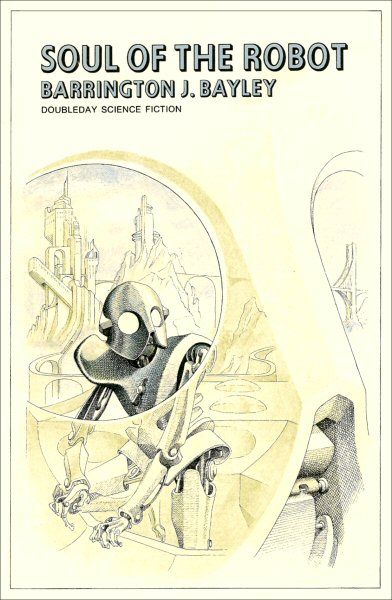I hated this book
The Soul of the Robot
By Barrington J. Bayley

6 Oct, 2014
0 comments
Although I think of Barrington J. Bayley as a charming oddity from the 1970s, I see his career actually began in the 1950s and continued into the Aughts. Still, of the sixteen Bayley novels of which I am aware, nine are from the 1970s and only three date from later than the mid-1980s. Apparently he was influential on a number of higher profile authors, all of whom will probably be happier with me if they stop reading now.
The Soul of the Robot begins in the moments as the robot Jasperodus becomes aware. Within moments he has taken in and rejected his two elderly creators, who forged him as a child-replacement, and set off to explore the world. As we learn later, the means by which he was shaped meant the form of his mind was to a fair extent unpredictable and it’s pretty clear “gratitude” was not a large fraction of the result.
Jasperodus is very much First Law non-compliant, killing a soldier within moments of encountering the poor fellow because Jasperodus was piqued that the soldier was shooting at him. Conveniently for Jasperodus, the era he lives in is one between great world states; the Earth has again collapsed into barbarism, nations and warlordism, so his lack of empathy and inclination towards lethal violence fits in very nicely with the societies he encounters.
Cunning and ruthless and yet yearning for a place in greater society, Jasperodus toys with ruling a kingdom on his own before offering his services to Tansiann, the realm that seems to have the best odds of replacing the fallen Rule of Tergov. His talents make him an asset to Charrane of Tansiann but as he eventually finds, the line between asset and threat can be very slender indeed.
What Jasperodus finds most disagreeable is the assumption by the humans that all robots are soulless creations to be used and discarded according to whim. His initial reaction is lash out at those who try to bend him to their will but as he gains more experience with the ways of the robots, he begins to see that the humans have a point. The most sophisticated robots around him are still only cunning machines, less than the least human. Can he be certain he is truly different or his consciousness merely a sophisticated illusion so convincing even Jasperodus fell for it?
I feel like I need to start off positively. I will say I now have another example of a novel set in an interregnum between successive world states.
According to Wikipedia, the seed of this short novel was the 1956 story “Fugitive” but to be honest if it were not for a particular element I would have guessed this was at least 20 or 30 years older than that. The nonsense that Bayley tosses out to explain the irreducible difference between living and mechanical minds is essentially vitalism, not something that I would expect to encounter in a novel as recent as this one. Well, at least not from anyone who isn’t a woo-woo bunnies-and-light sort.
It may be as unfair to object to Bayley’s rubber science as to Bradbury’s.
What establishes the period this book was published is the author’s treatment of women, which marks the book as having come out in that period after male SF authors discovered sex but before they began to suspect that in many respects women could be said to be akin to people. A robot like Jasperodus may struggle with the question of whether his consciousness is real or an illusion but I can assure you that question never, ever comes up for a woman in this book. Women exist almost purely to satisfy lusts of men and suitably equipped robots. The lucky women are willing participants but their desires in this matter are never of consequence.
The novel would have a certain archaic charm if the sexism was less pronounced. I found it hard enough to buy into the problem of Jasperodus’ consciousness, fueled as it is with high octane nonsenseolium but once I got to the rape scene on page 18 the only thing keeping me from tossing it into recycling was that it was short and for a sponsored review. There are other books that handle the issue of consciousness better and certainly more skillfully written books about naive robots finding their way in existence. I cannot recommend this book.
Fans of rapey robot books can purchase this work in a variety of formats.
